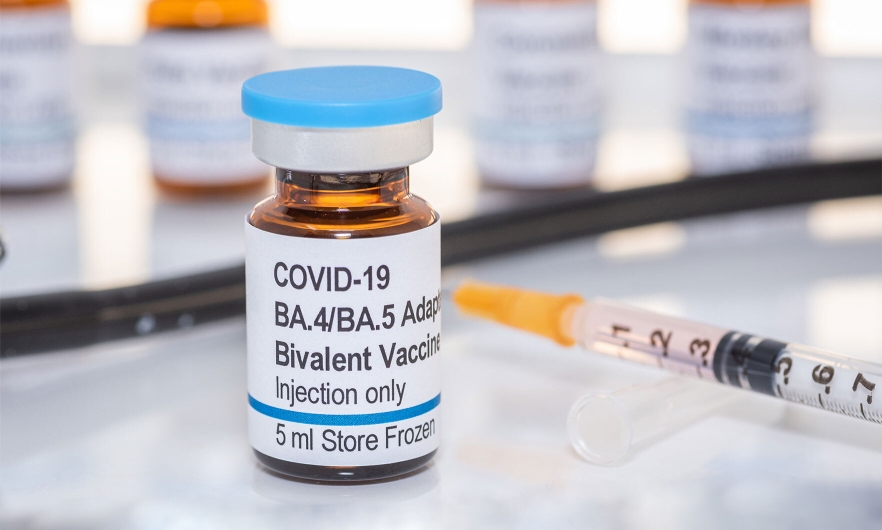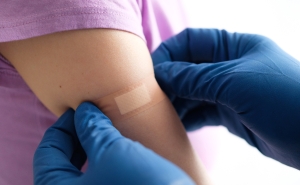Have Questions About the Bivalent Booster? We Have Answers.
Why do I need to get this shot? How do I know if I received a bivalent COVID-19 booster? Epidemiologist Keri Althoff answers these questions and more.

When vaccines for COVID-19 rolled out in late 2020, people of all ages rushed to get in line. We flaunted our vaccination cards on social media and helped find appointments for friends and family.
Three years later, only a small fraction of the eligible U.S. population has gotten the bivalent booster designed to protect against the omicron variants currently circulating.
We asked Keri Althoff, PhD ’08, MPH ’05, an associate professor in Epidemiology, to help us address some of the questions and concerns people may have about getting the bivalent booster.
Another COVID vaccine? If they work so well, why do we need more?
Vaccines are effective, but the immunity they give you wears off over time. The bivalent booster builds upon your previous vaccinations to keep your immune system ready to help you avoid serious illness.
The virus that causes COVID-19 is much different now than it was when the first vaccines came out in late 2020. The bivalent boosters are designed to address both the original strain of the virus and the more contagious omicron variants that have emerged since.
In fact, even as newer variants—like BQ.1, BQ.1.1, and XBB.1.5—become dominant in the U.S., the bivalent boosters are continuing to protect against severe disease, hospitalization, and death.
What’s the point of the booster if I can still get infected?
The purpose of the booster is to help you bounce back faster if you do get sick, and to keep you out of the hospital. Studies show it’s doing this well, even with the newer variants.
Without the updated booster, you’re more likely to experience more severe symptoms that last longer.
I felt lousy after my previous COVID shots. I really don’t want to deal with that again.
While post-vaccine side effects like fatigue, fever, and chills aren’t enjoyable, they are normal, and experiencing them means that your immune system is working properly. You can also talk to your doctor about taking over-the-counter medications to reduce discomfort.
Your experience with the booster won’t necessarily be the same as when you got your prior vaccines. After all, your immune system is stronger against COVID now than it was when you got your previous doses.
If you’re still not sure, consider changing up vaccine brands. For example, if you had uncomfortable side effects from Moderna vaccines, try Pfizer for your bivalent booster. And of course, talk through any concerns with your doctor.
Someone I know had COVID recently and said it wasn’t that bad.
Getting the booster increases the likelihood that your illness will also be mild if you do get infected.
Every individual’s risk factors for and experiences with COVID are different, and while overall the virus appears to be evolving to cause less severe illness, thousands of people across the U.S. are still being hospitalized with it every day.
I can’t take time off work to get the booster.
In an ideal world, everyone would have enough paid leave to take care of their health.
That said, it’s a safe bet that the time required to get your booster is less than the time you’d need to take off if you get sick with COVID while unboosted. Schedule your booster when it’s convenient for you. You can’t predict when you might get sick, and being boosted means you’ll be back on your feet faster if you become infected.
I don’t remember which COVID vaccines I’ve gotten. How do I know if I’ve already gotten the bivalent booster?
If you received a booster dose after the date the bivalent booster was rolled out for your age group, you received the bivalent booster. Those dates were:
- September 2, 2022, for people 12 years and older.
- October 12, 2022, for people ages 5–11.
- December 9, 2022, for children 6 months–4 years who completed the Moderna COVID-19 vaccine primary series.
If you’re not sure, your COVID vaccination records (either your card or your state’s vaccination database) should indicate exactly what you received and when.
I just can’t keep up with which vaccines I’m supposed to get. It seems like the COVID guidelines keep changing.
A lot has happened in the three years since the pandemic began. Recommendations have changed as experts continue to learn more about the coronavirus, how it spreads, and how it’s evolving.
The CDC has easy-to-follow guidelines for which vaccines and boosters are recommended for each age group, as well as for people who are immunocompromised and an interactive tool to determine if you’re up to date on COVID vaccines.
I don’t really care if I get COVID. I’ll be fine.
Staying up to date on vaccines isn’t just about our individual health. It’s about the people we interact with and care for.
If you aren’t worried about getting infected, consider the more vulnerable people in your life and those who may rely on you: kids, pets, parents, partners. Consider the older person behind you at the grocery store checkout or the loved ones you want to visit in a residential facility.
When it comes to public health, it’s important to focus on the “we” instead of just “I.” We’re all connected, especially when it comes to highly transmissible respiratory viruses.
I have more questions. Where can I get answers?
First, check the CDC’s list of frequently asked questions about vaccines and boosters. Your local health department is another great resource and will have information about where you can get your booster. For questions related to your individual circumstances or health conditions, talk with your doctor.
Aliza Rosen is a digital content strategist at the Johns Hopkins Bloomberg School of Public Health.





